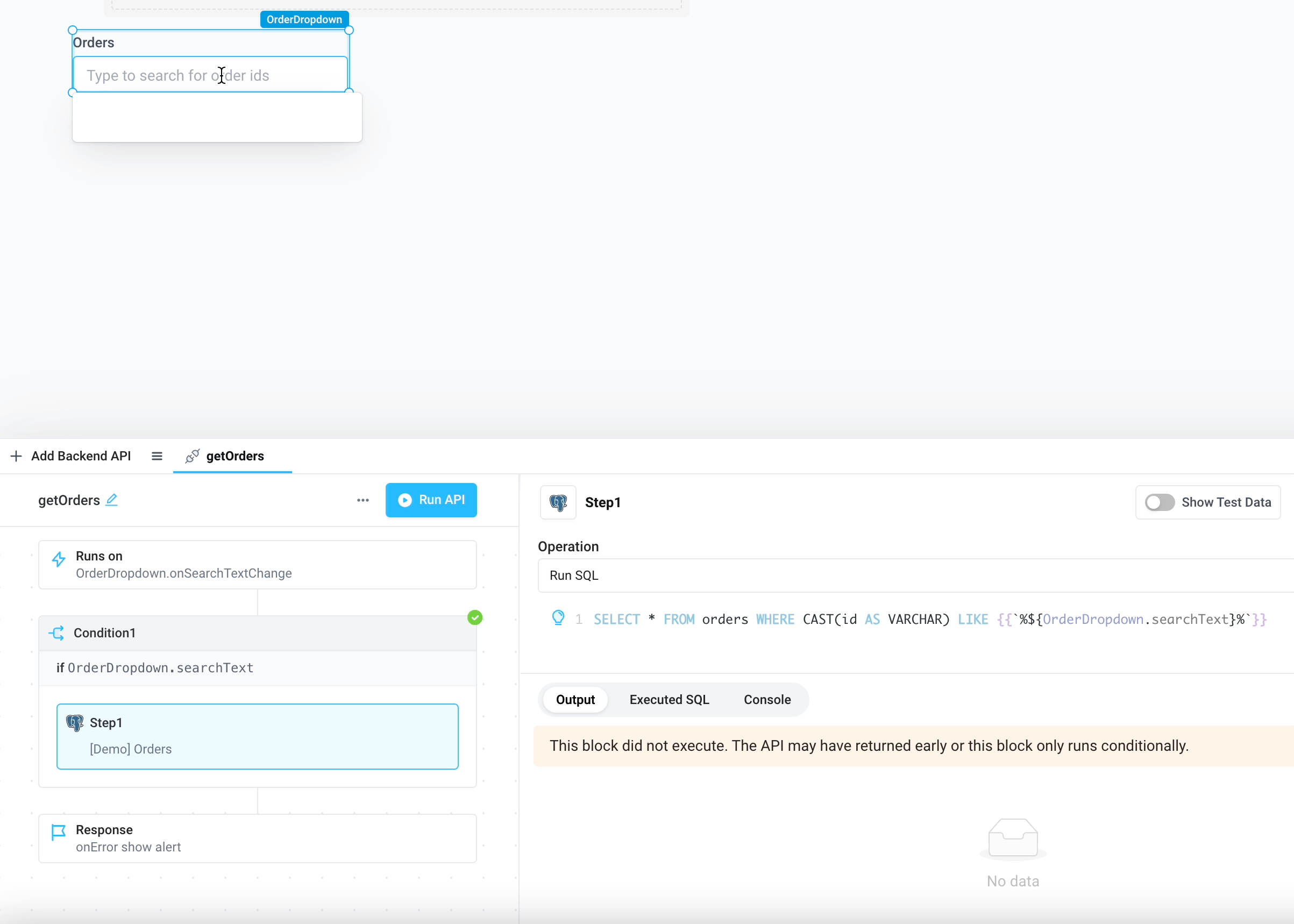Dropdown
Allows users to select one or more values from a predefined list, which can serve as input and trigger actions within the application as needed.
Dropdown Properties
Component Properties
| Property | Description |
|---|---|
| Content | |
| Label | Set the text label for the dropdown |
| Options | Enter an array of strings or an array of objects where each object has a property that will map to the option label, value and optionally icon. The label and icon will be presented to the user and the value will be returned as the {{dropdown.selectedOptionValue}} |
| Default selected value(s) | Choose the default selected value(s). If the dropdown is a single-option select, provide a single value. If it is a multi-option select, provide an array of values |
| Appearance | |
| Label position | Position the label above or to the side of the input |
| Label style | Changes the style (font, size, color, etc.) of the Dropdown's label text. Configure styles in the Typography settings |
| Icon | Select an icon to be displayed in the dropdown input. If the selected option has its own icon, it will override this icon. |
| Placeholder | Text to inform the user of action like "Select an option" |
| Input text style | Changes the style (font, size, color, etc.) of the Dropdown's input text. Configure styles in the Typography settings |
| Loading animation | Controls the loading state of the component, values are a boolean |
| Layout | |
| Padding | Controls the the padding inside the dropdown input |
| Width | Controls the width of the component |
| Height | Controls the height of the component |
| Visible | Controls the visibility of the component, values are a boolean |
| Collapse when invisible | Controls what happens when the component is invisible. When true, other components shift to fill its space; when false, it leaves a blank space. This has no effect in edit mode. |
| Interaction | |
| Multi-select | Allows the user to select multiple options from the dropdown. The selected options can be accessed using {{dropdown.selectedOptionValues}} |
| Select/Deselect all | When enabled, allows the user to clear a multi-select dropdown's options with an x button |
| Clearable | When enabled, allows the user to clear the selected option with an x button |
| Client-side filtering | Enable client-side typeahead filtering of options via fuzzy matching. When implementing server-side filtering, we recommend disabling this setting to avoid flickering |
| Required | Makes selecting an option mandatory, values are a boolean |
| Disabled | Disables user interaction with this component, values are a boolean |
| Error display | Toggles whether an error should be displayed in a Tooltip when hovering or Inline below the input. |
| Validation | Programmatically sets a custom validation rule. |
Settable Properties
| Property Via Form / Via RunJS | Type | Example Value |
|---|---|---|
Selected Option / selectedOptionValue | One of:string, number, Array<string>, Array<number> | "TORONTO" , ["TORONTO", "NEW YORK"] |
Reference Properties
Properties can be accessed from other frontend components and backend APIs by adding the name of the Dropdown, and dot referencing the property. For a Dropdown named Dropdown1:
| Property | Description |
|---|---|
Dropdown1.selectedOptionValue | Returns the selected value of the dropdown |
Dropdown1.selectedOptionValues | Returns an array of the selected values of the dropdown |
Dropdown1.searchText | Returns the string value in the search input in the dropdown (often used for server-side typeahead filtering of options) |
Dropdown1.options | Returns an array of the options of the dropdown |
Dropdown1.isVisible | Returns the boolean value of the component's visibility (True, if it is visible) |
Dropdown1.isDisabled | Returns the boolean value of the component's disabled state (True, if it is disabled) |
In order to reference other values from the underlying data structure of a dropdown, please see the example in option 2.
Events
The following events are triggered by user interactions with Dropdown components. Use event handlers to trigger actions in response to user events.
| Property | Description |
|---|---|
| onOptionChange | Triggers an action when the selected option is changed |
| onSearchTextChange | Triggers an action when a user types in the search box (often used for server-side typeahead filtering of options) |
| onClear | Triggers an action when the dropdown is cleared |
Example Usage:
Dropdown options
Start by dragging a Dropdown component from the Components panel.
To set the options a user can select in the dropdown, you pass the list of options into the Options property in the properties panel.
Under the hood, each option has a label and value.
- The label is the text shown in the dropdown option
- The value is the output resulting from selecting that item in the dropdown. This value can be referenced in components and APIs using
{{<DROPDOWN_NAME>.selectedOptionValue}}for a single-select or{{<DROPDOWN_NAME>.selectedOptionValues}}for a multi-select dropdown.
Options data format
There are a few ways you can structure your options:
- Pass a list of objects where each object has a
labelandvalueproperty. For example:
[
{
label: "Option 1",
value: 1,
},
{
label: "Option 2",
value: 2,
},
];
- Pass an arbitrary list of objects. You can then map the
labelandvaluefields to properties in your object in the properties panel. This pattern is useful so you don't need to transform your options objects into a specific format in code. For example:
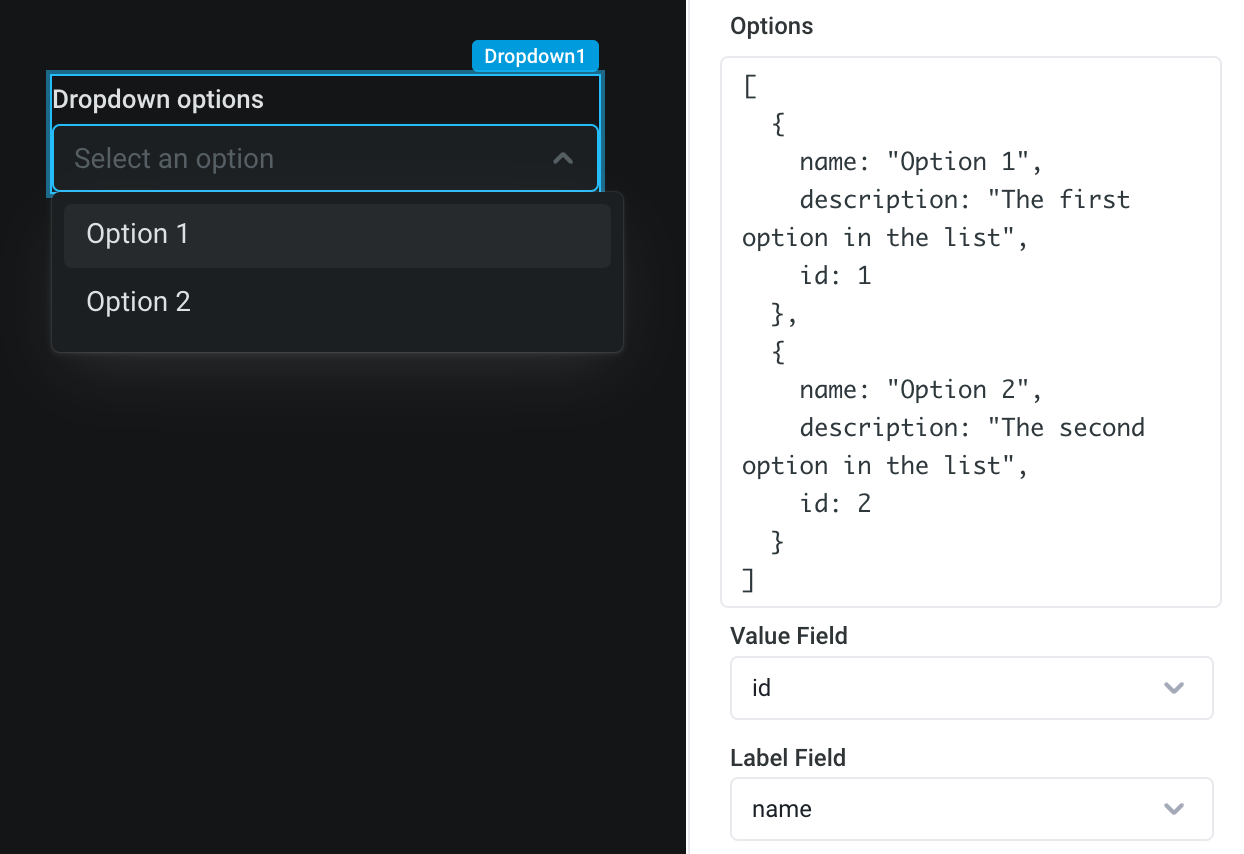
If you want to access the entire selected object, rather than some identifier of the selected item, this is also supported. This pattern is useful if you want to use information present in the source object elsewhere in your app.
To do so, you can select None (entire object) as the Value field. This will allow you to reference each key in the object. For example, you can use {{Dropdown1.selectedOptionValue.description}} to access the corresponding description.
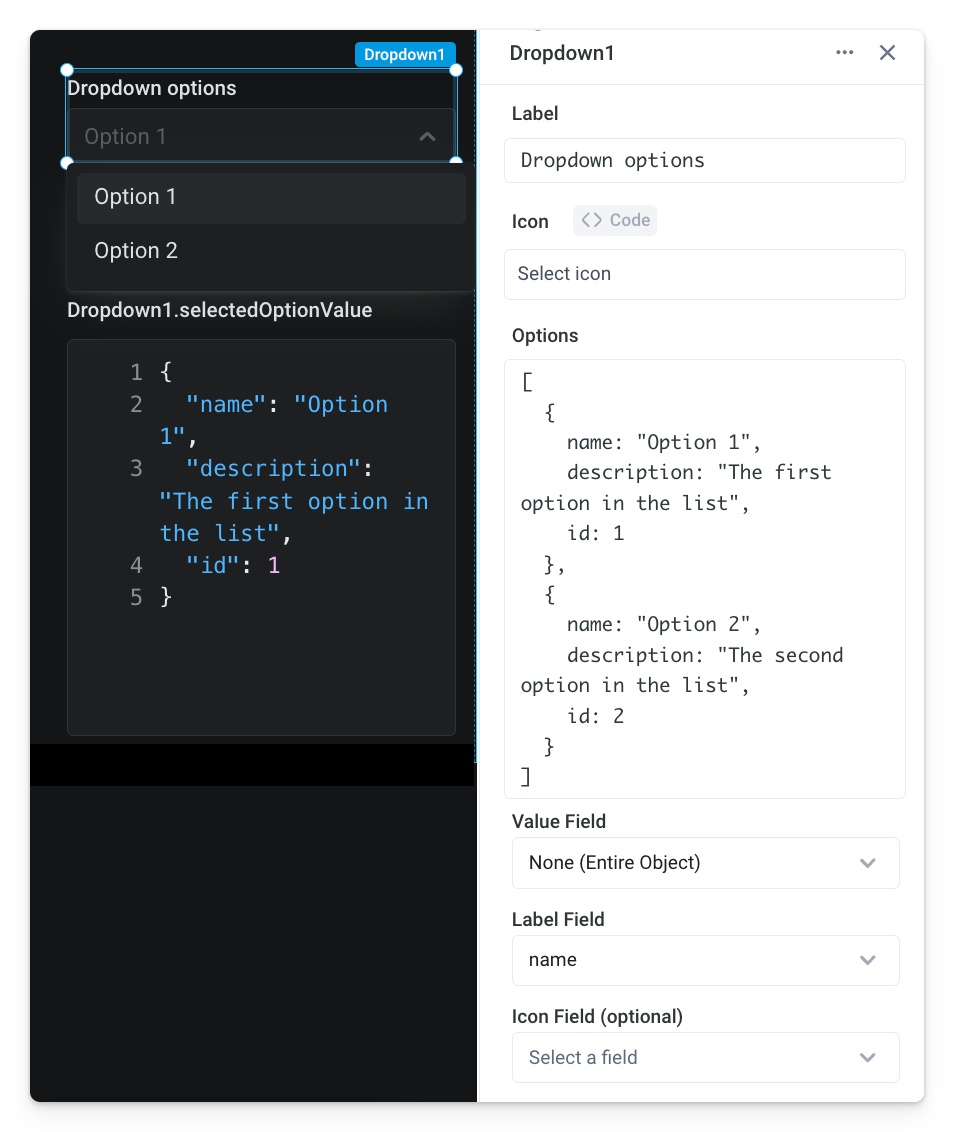
- You can pass a list of strings or numbers, like
["option 1", "option 2", "option 3"]. Using this format sets both thelabeland thevalueto the list item.
Trigger an API on select
Using the previous example, the user can next filter a table of order statuses based on the selected order id. To do so, first create an API that gets the Shipping History for an order from Snowflake. Reference the selected order id with {{<DROPDOWN_NAME>.selectedOptionValue}}.
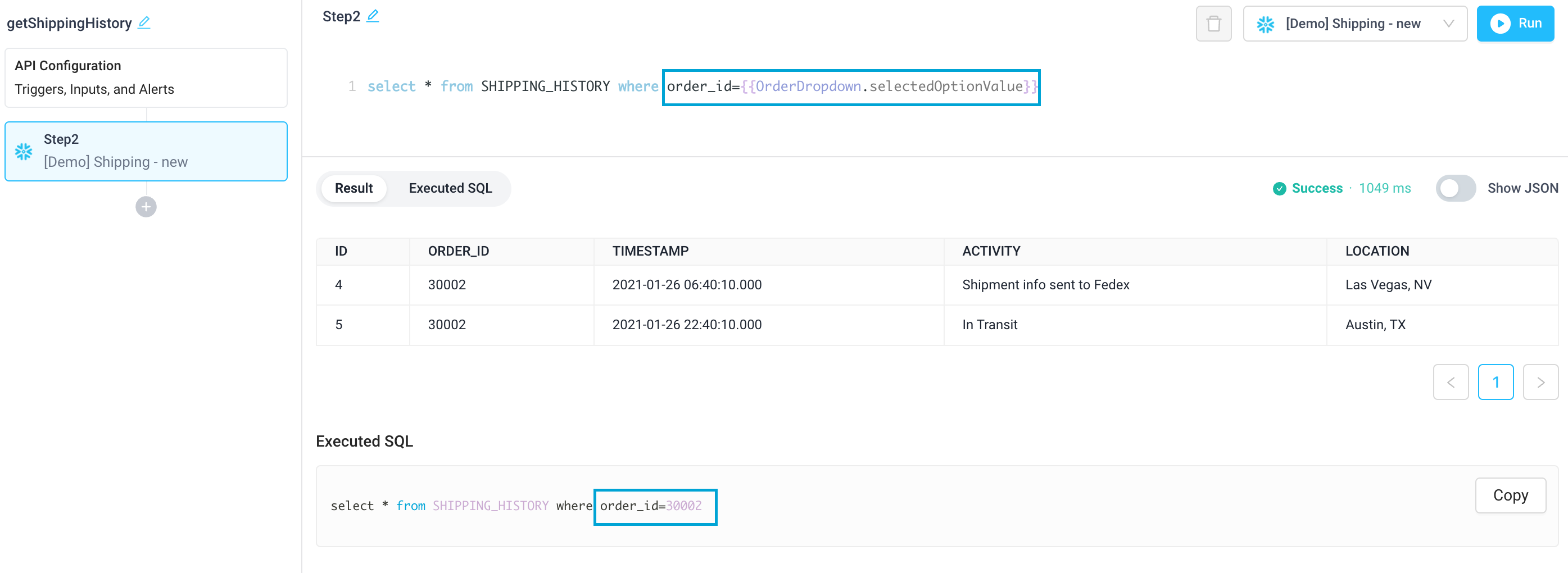
To ensure this API is called when the dropdown option is selected, configure the dropdown's onOptionChange trigger.
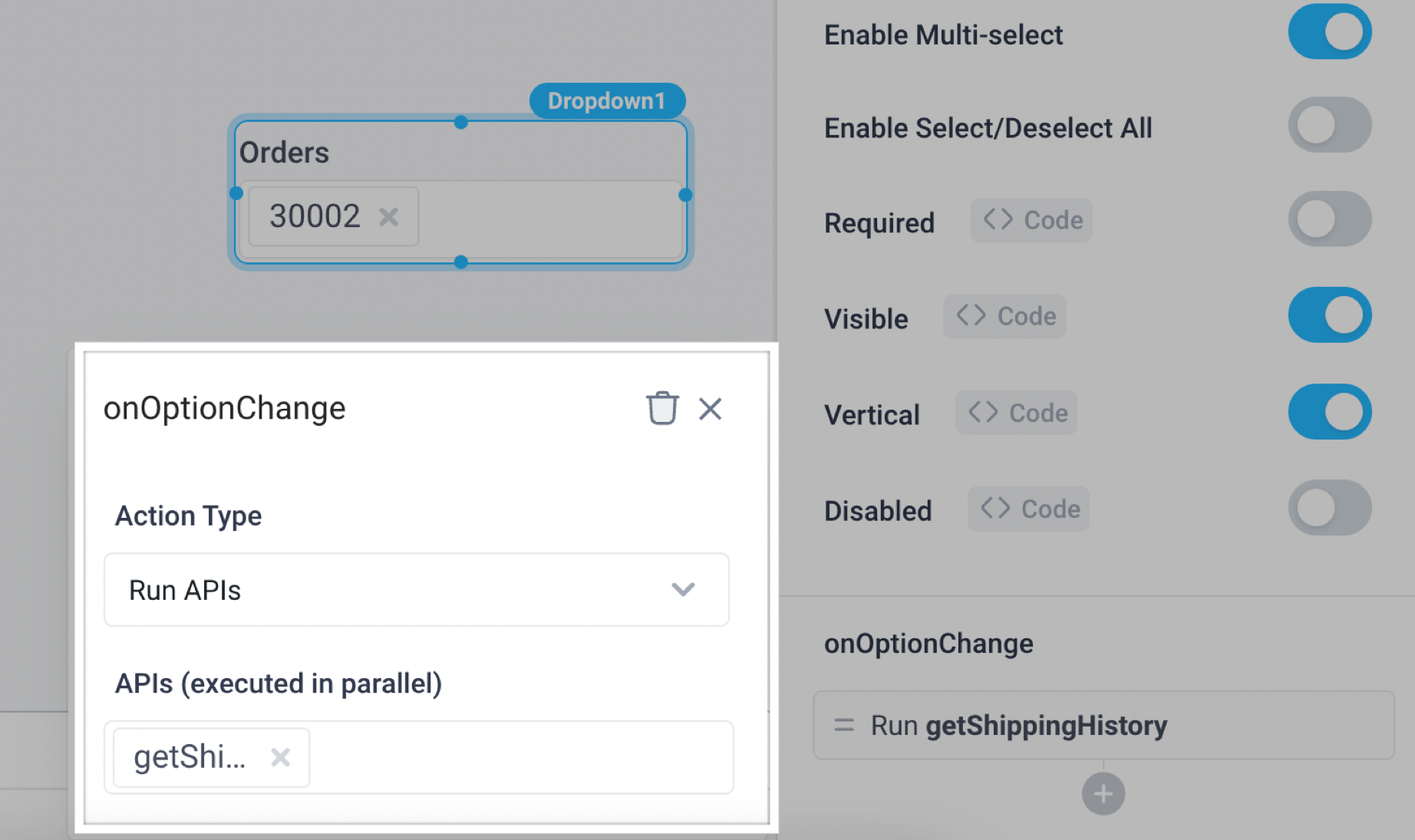
Add a Table component below the dropdown and configure the Table Data to bind to {{getShippingHistory.response}}. The table will now update to reflect the order id selected in the dropdown.
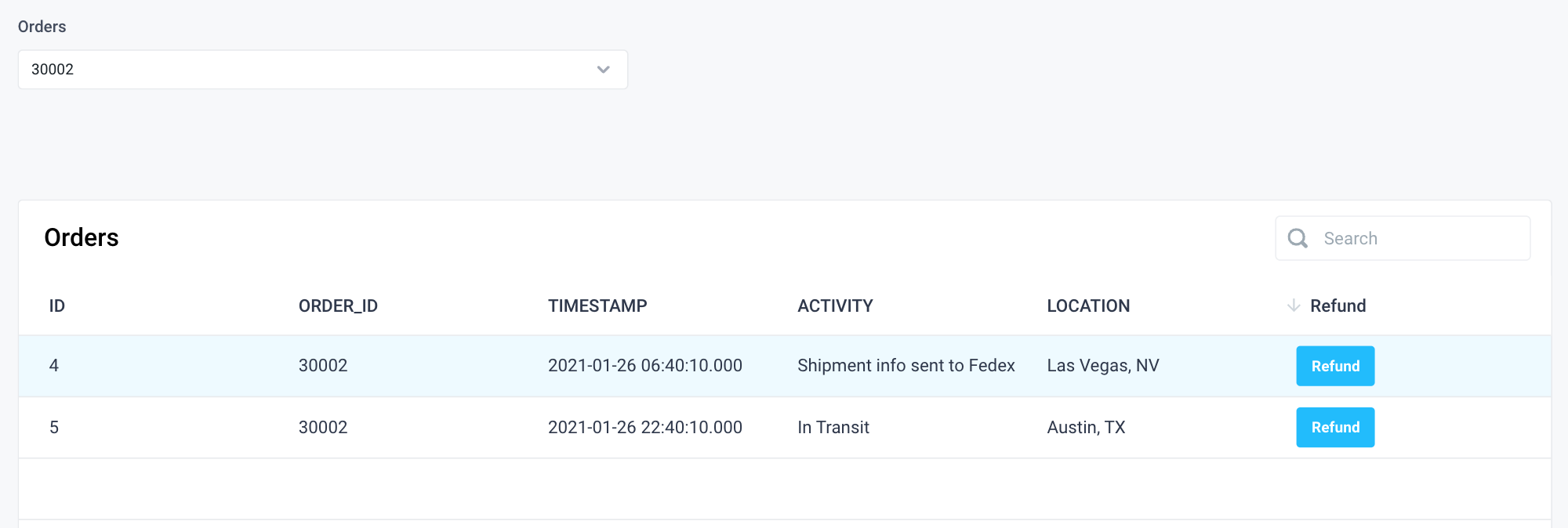
Dynamically set dropdown options from API response
You can set the dropdown options dynamically using a backend API. This API can either retrieve and load all possible options for the user to perform client-side filtering, or it can implement server-side filtering to retrieve and load only options based on the user's search.
Dropdown client-side filtering
To load all possible options into the dropdown and allow users to filter these options client-side, create an API that fetches all the relevant fields on the backend. Here we've created an API called getOrders that queries the [Demo] Orders Postgres database for all orders:
SELECT * FROM orders

Reference the API response in the dropdown component Options via {{getOrders.response}}. Superblocks automatically configures the Value Field with one of the table columns from the resulting SQL response. Here, the Value and Label fields have been configured to be id. This allows users to select specific order ids from the dropdown and perform additional processing or investigation on them. Note, the Client-Side Filtering setting is enabled by default.
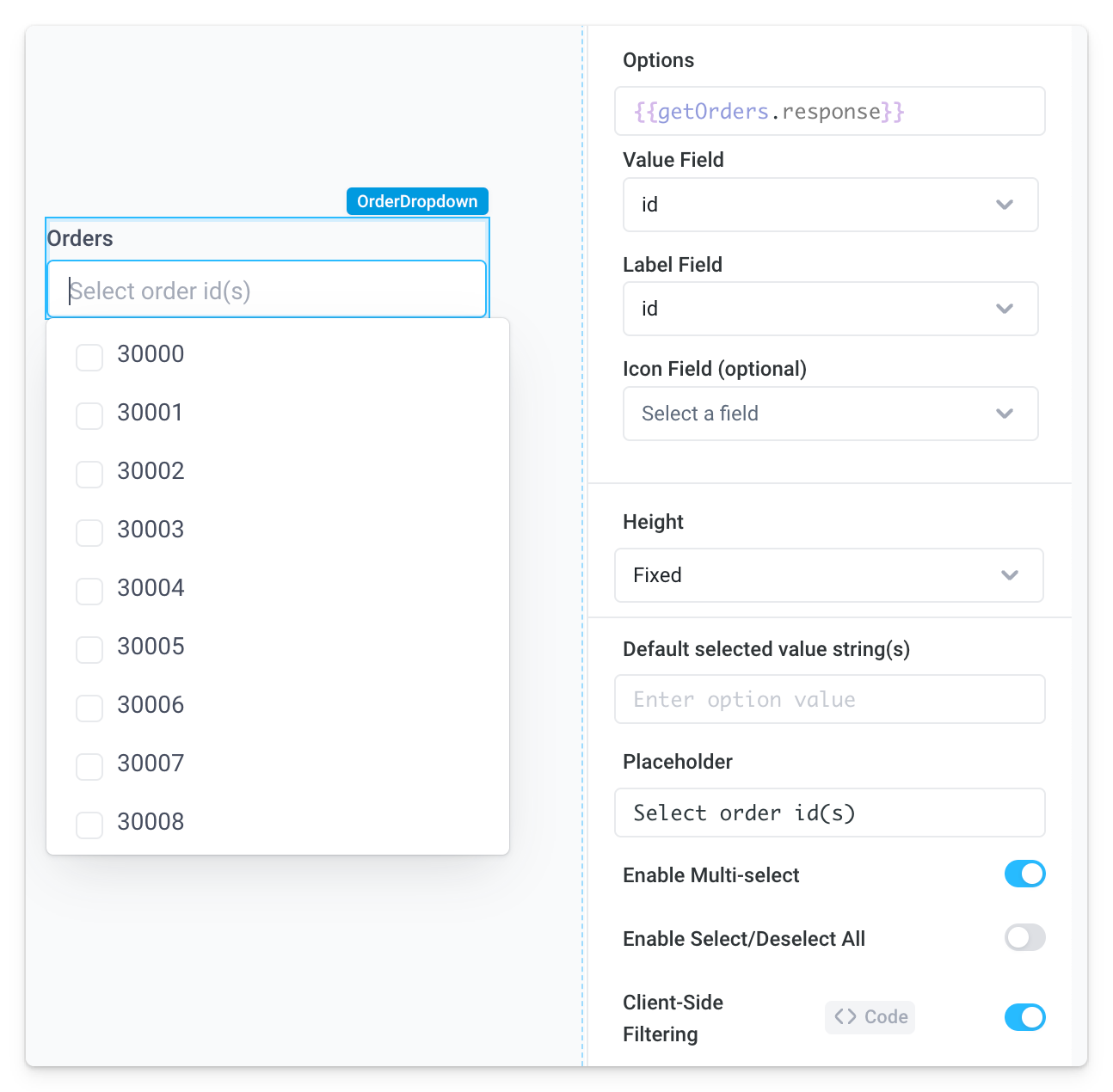
Dropdown server-side filtering
Alternatively, configure the dropdown and API so only values that include the user's search term are retrieved on the backend and loaded into the dropdown options (server-side typeahead).
- Add dropdown Placeholder text to instruct the user to type for options (optional)
- Disable the dropdown's Client-Side Filtering setting
- Set the dropdown's onSearchTextChange event handler to run the
getOrdersAPI
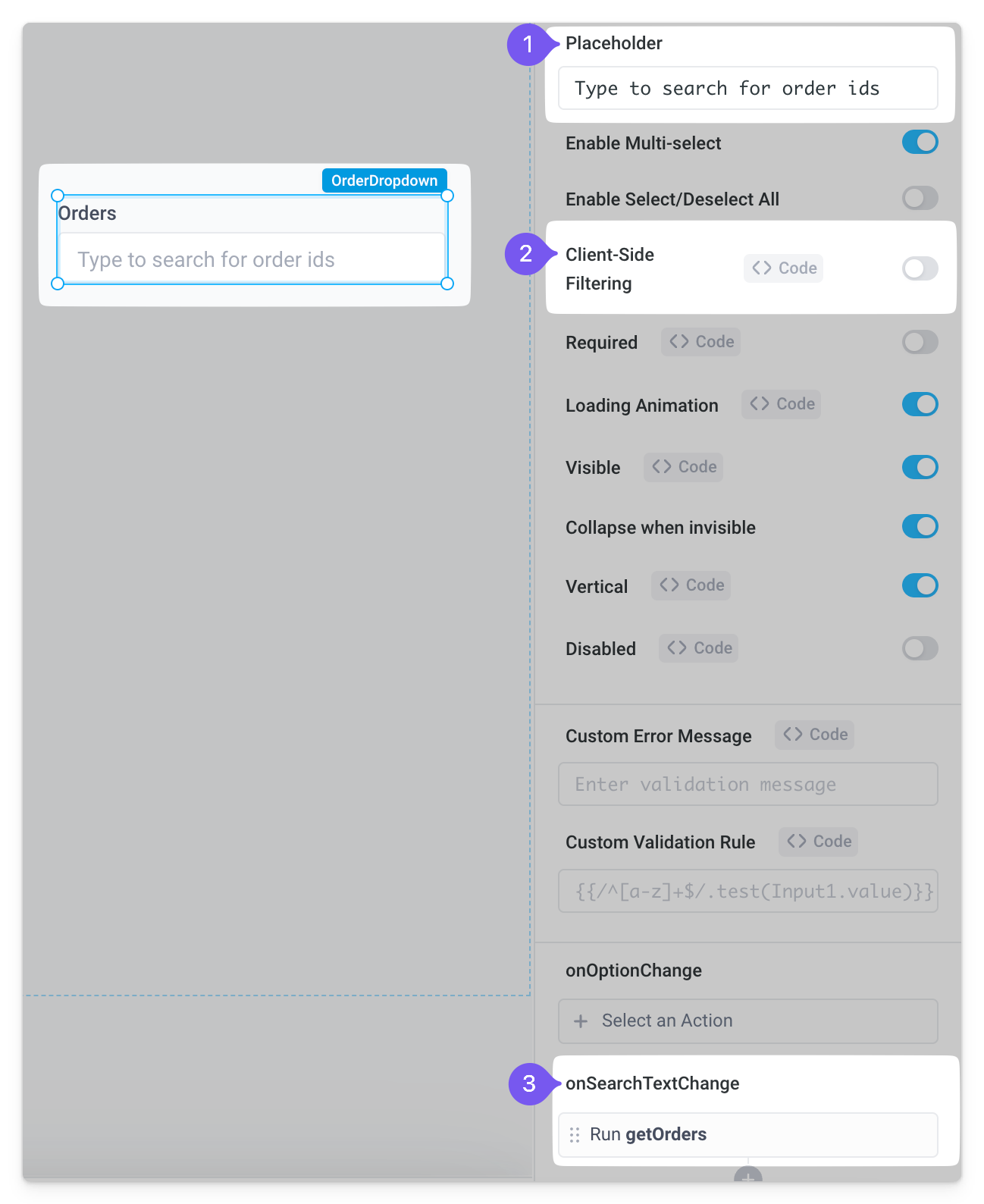
- In the
getOrdersAPI, set Run on page load to "Never" - Put the SQL step inside a Condition block where the If condition is set to
<DROPDOWN_NAME>.searchText - Lastly, update the SQL query so it filters on the data typed into the dropdown. Here we're using the
LIKEoperator with the%wildcard character, to match any sequence of characters containing the dropdown's search text. Because we're searching on a column that is an integer type in the database, we've also cast this to a varchar before doing the pattern comparison:
SELECT * FROM orders WHERE CAST(id AS VARCHAR) LIKE {{'%${<DROPDOWN_NAME>.searchText}%'}}
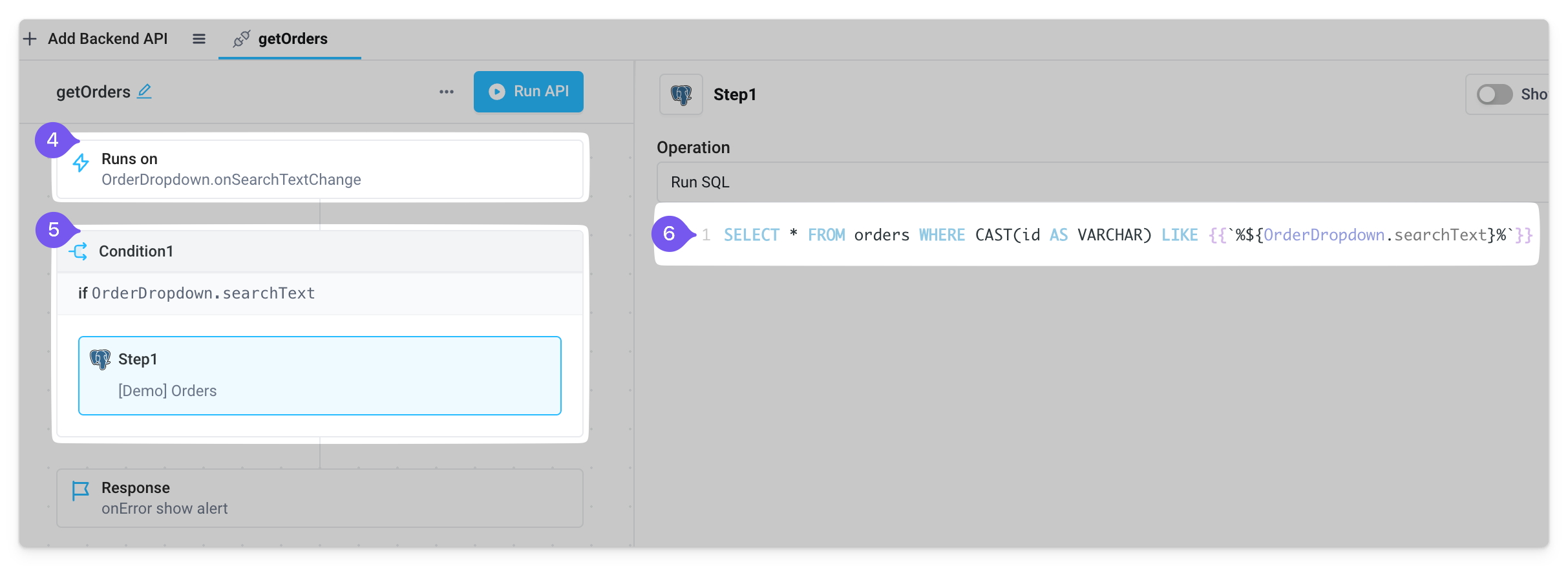
The end result is a dropdown that loads only the options the user searches.
